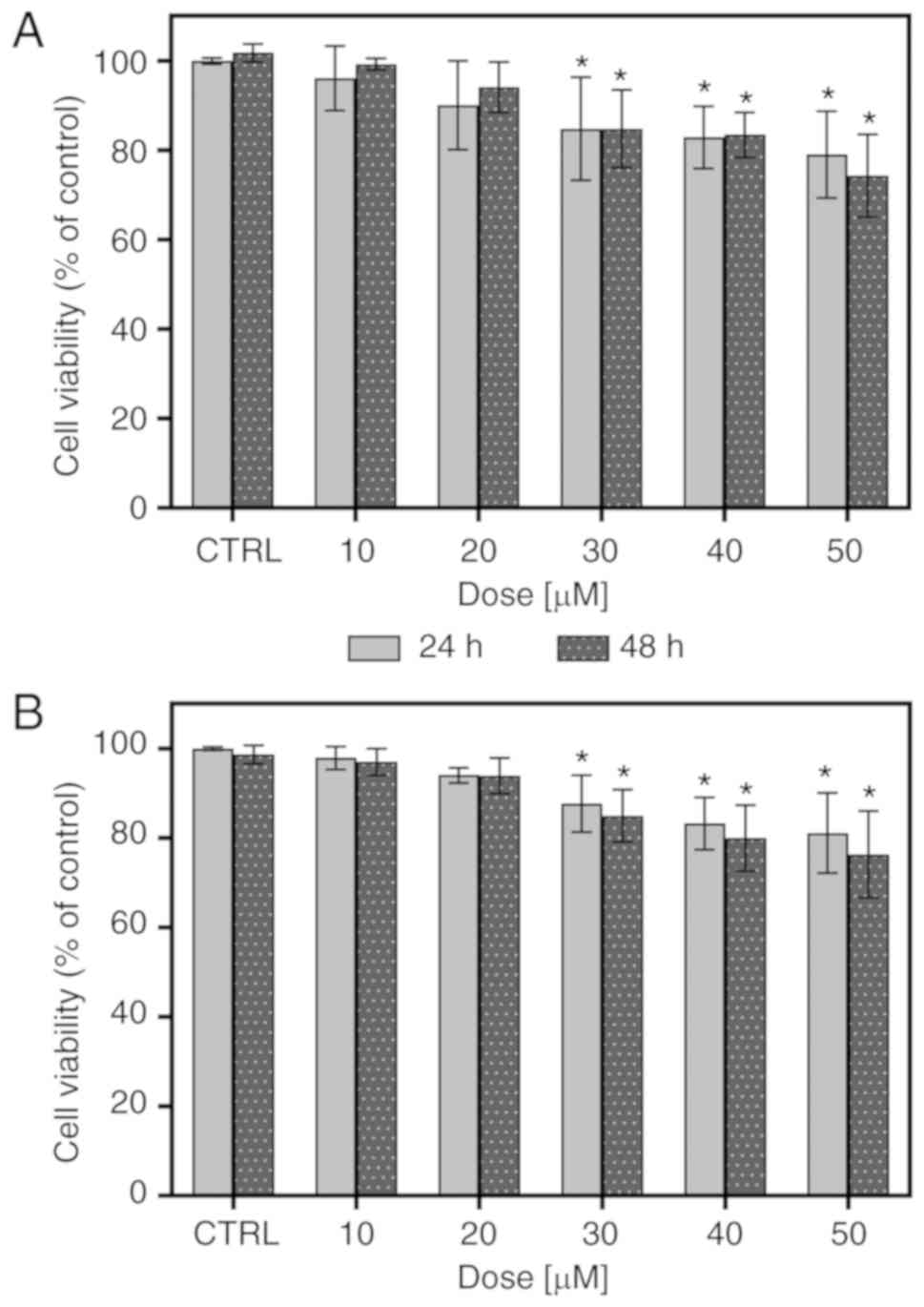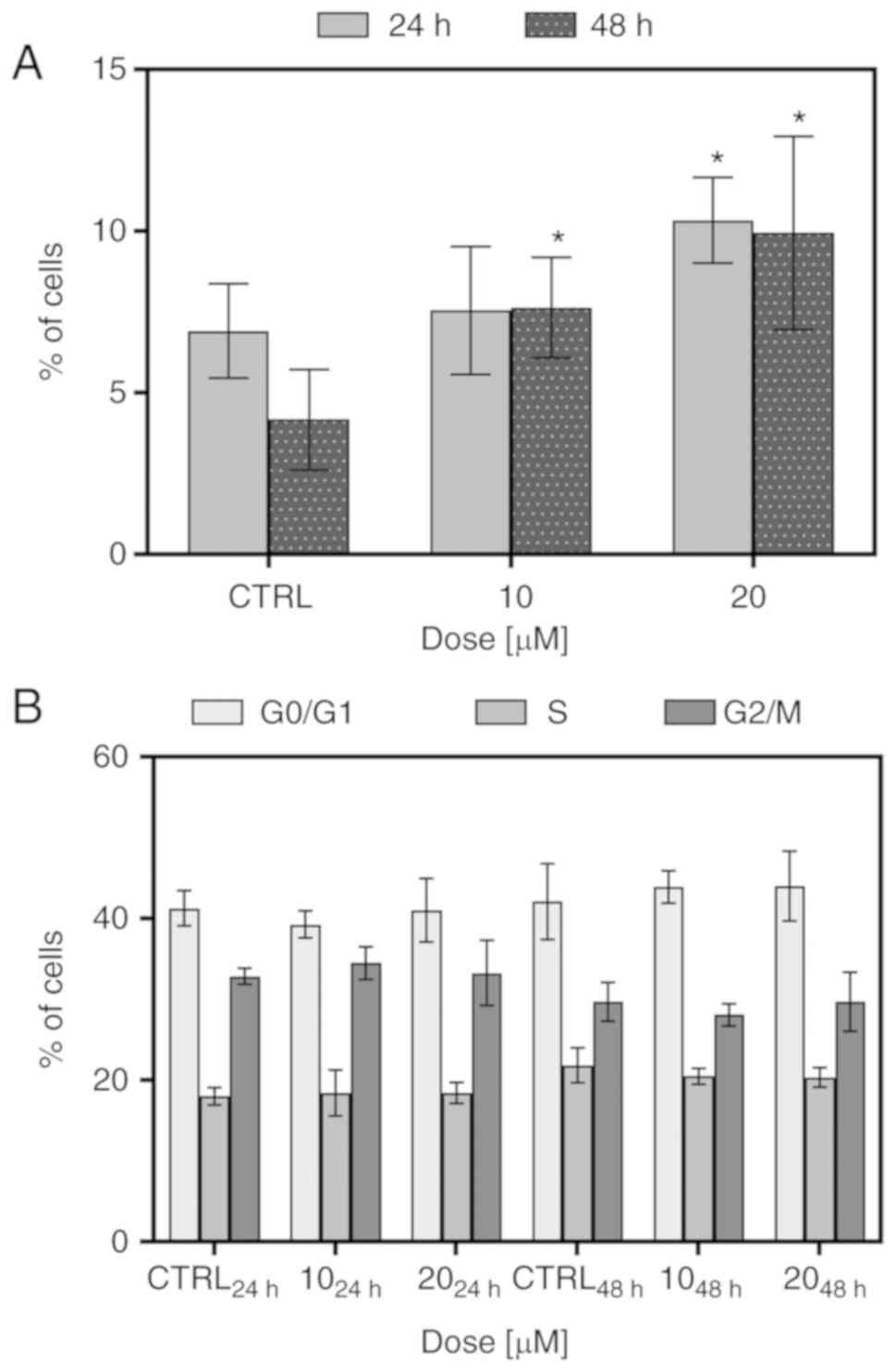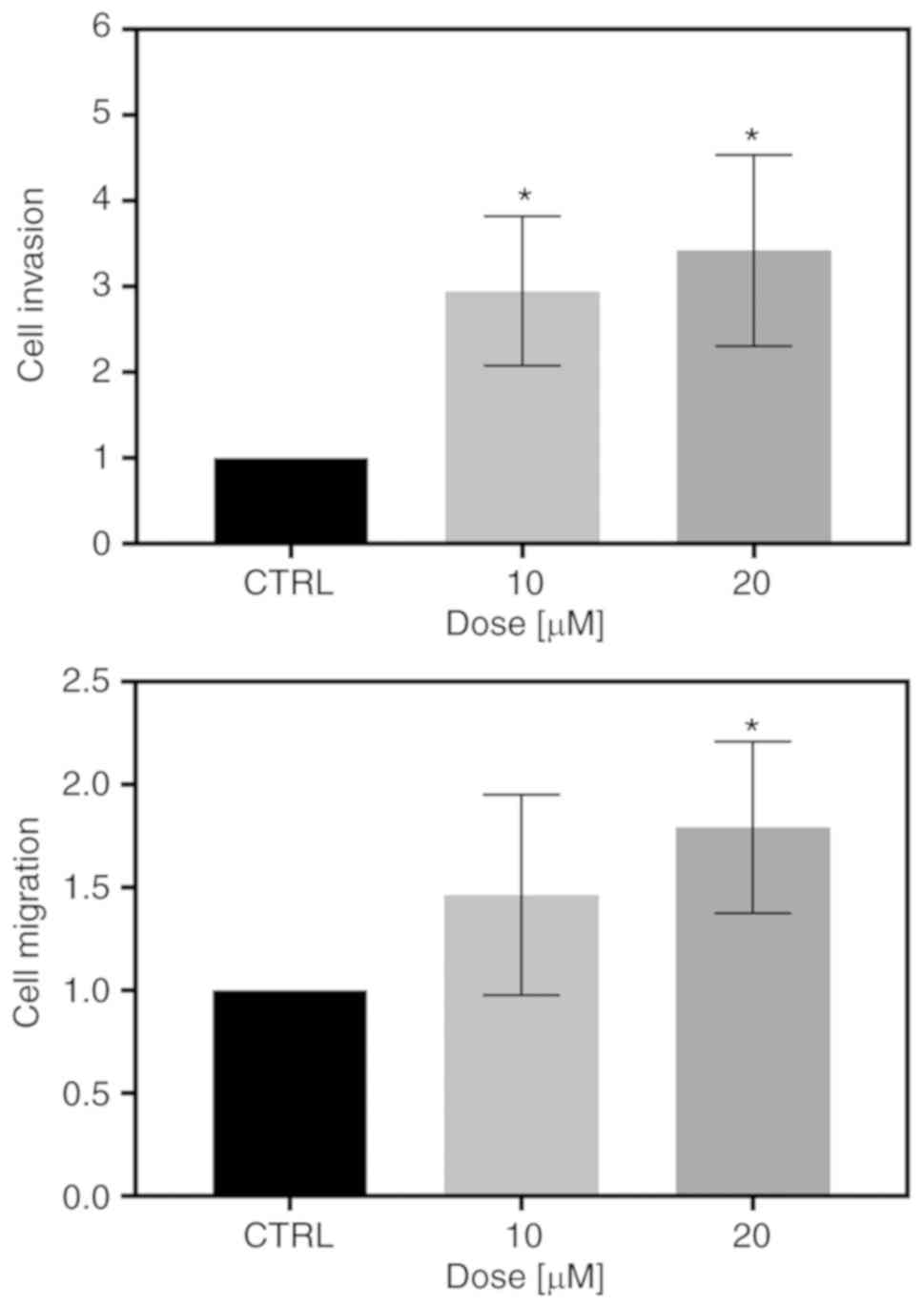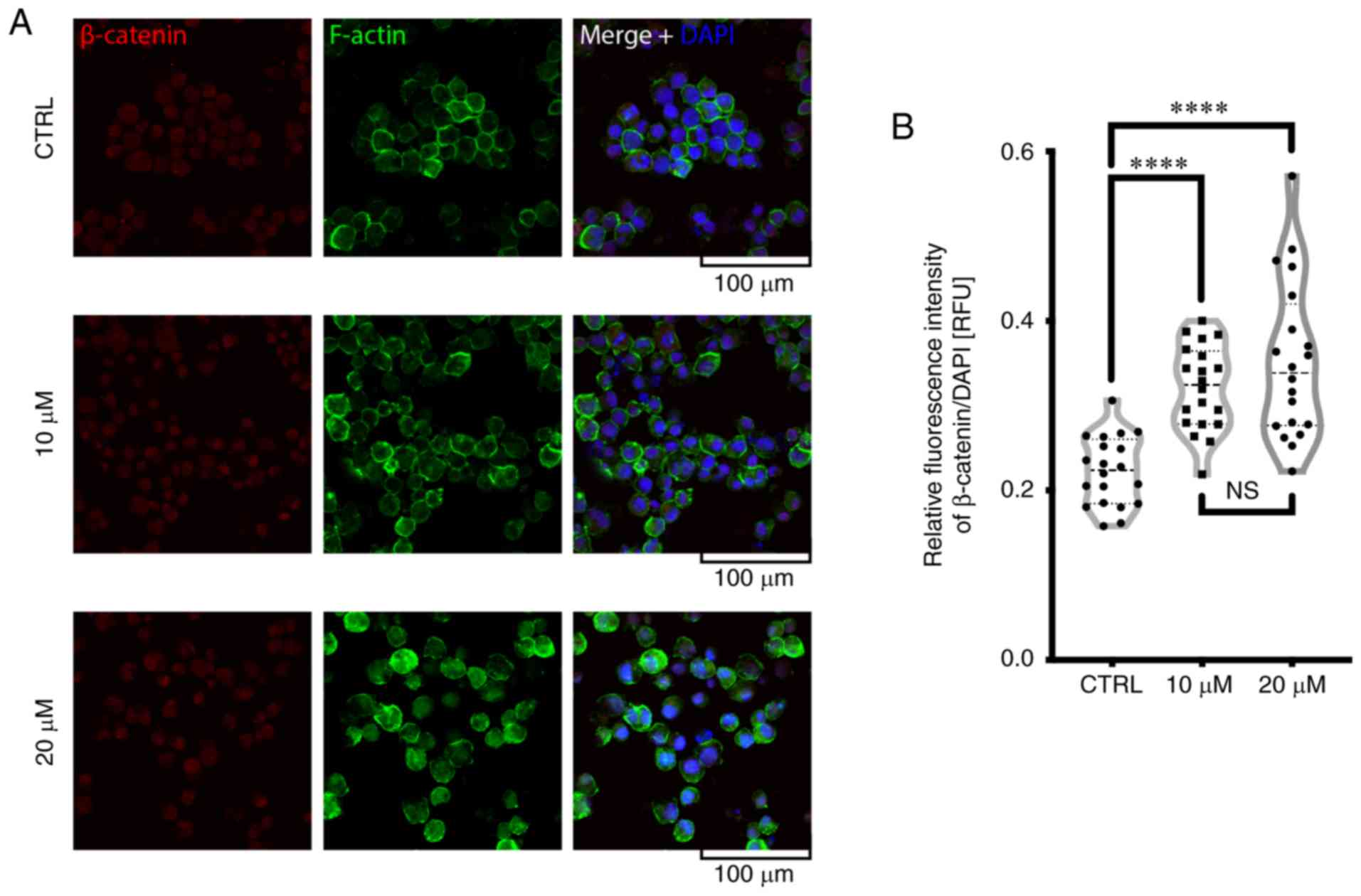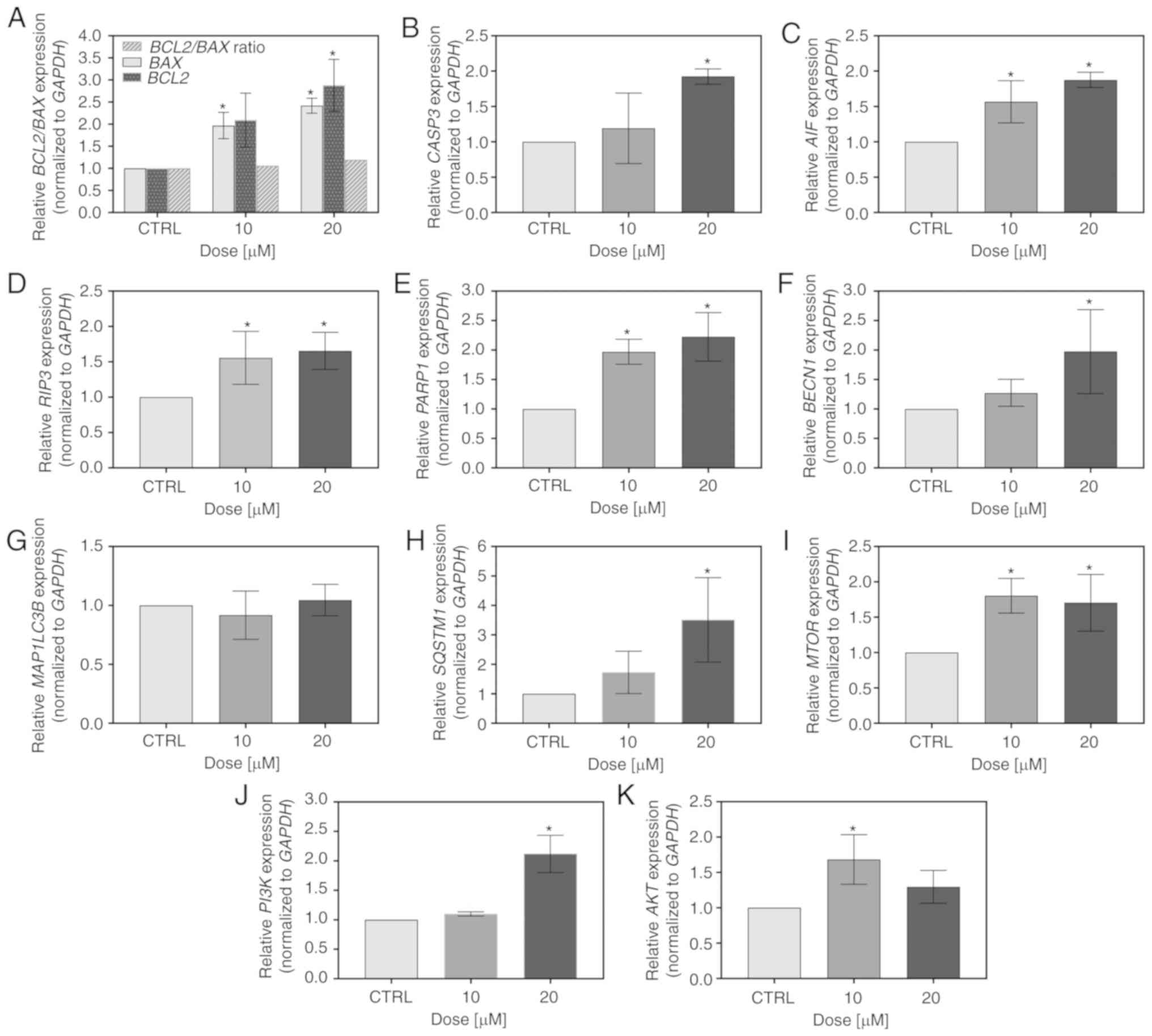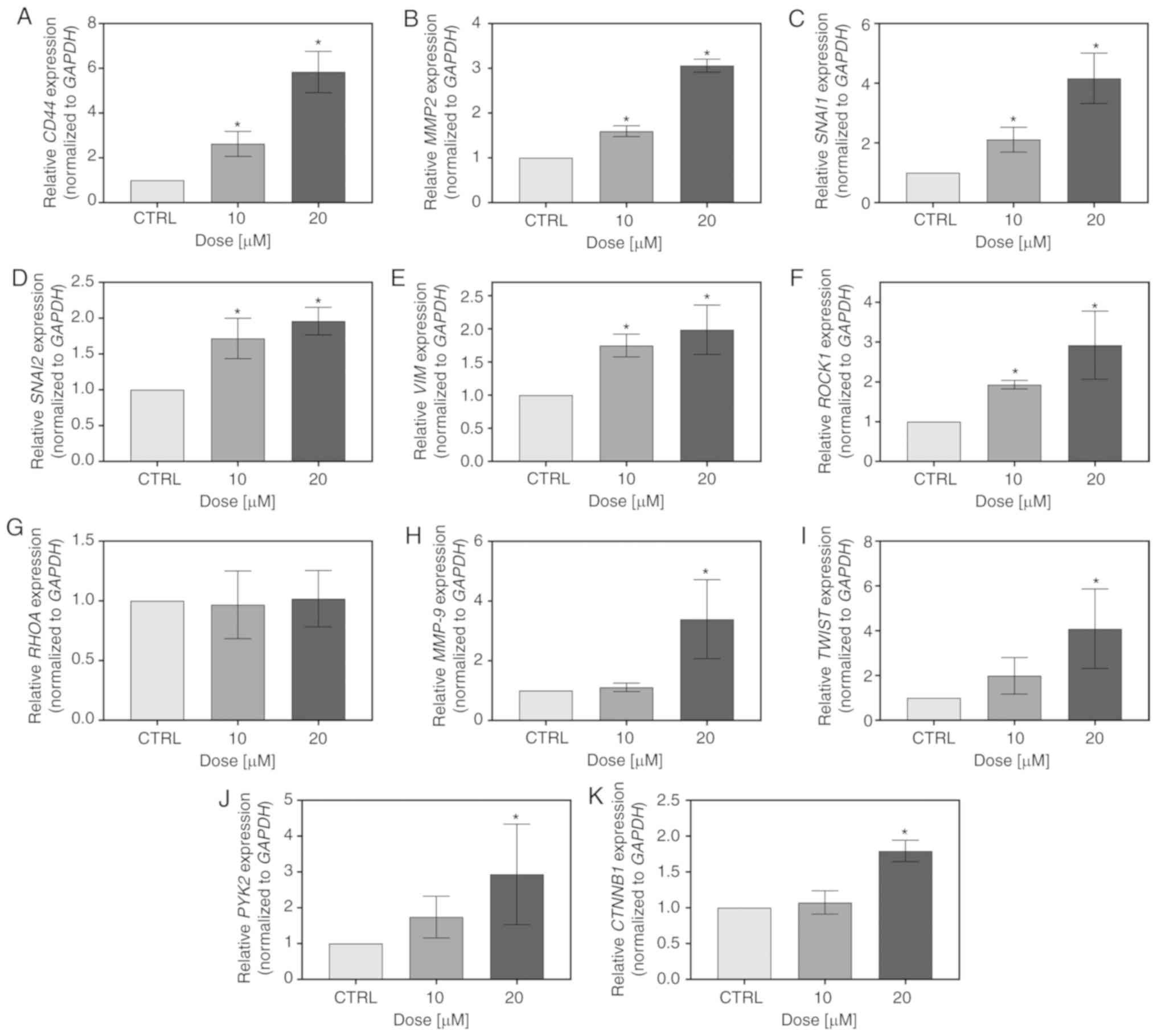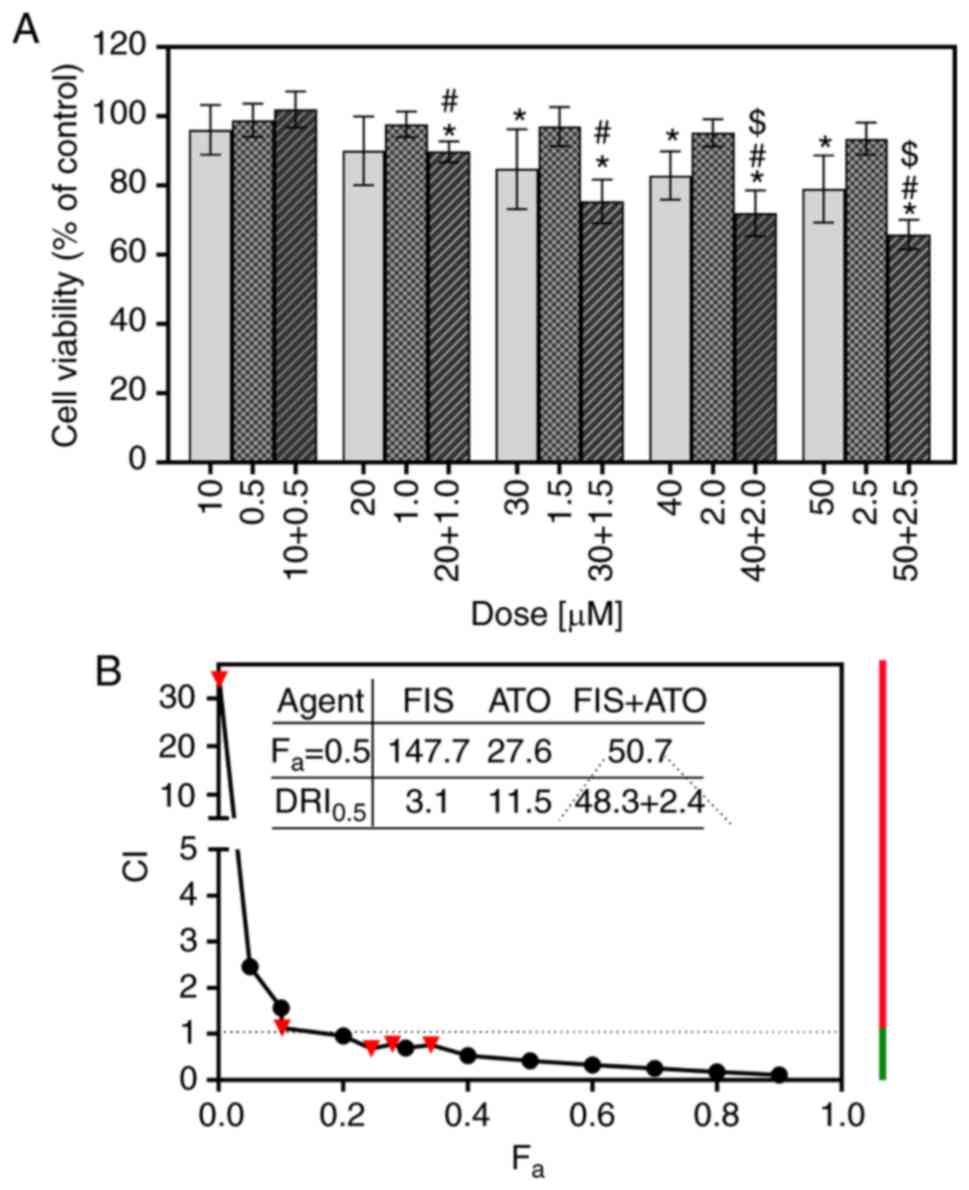|
1
|
Thomasset SC, Berry DP, Garcea G, Marczylo
T, Steward WP and Gescher AJ: Dietary polyphenolic
phytochemicals-promising cancer chemopreventive agents in humans? A
review of their clinical properties. Int J Cancer. 120:451–458.
2007. View Article : Google Scholar
|
|
2
|
Ramos S: Cancer chemoprevention and
chemotherapy: Dietary polyphenols and signalling pathways. Mol Nutr
Food Res. 52:507–526. 2008. View Article : Google Scholar : PubMed/NCBI
|
|
3
|
Sak K: Chemotherapy and dietary
phytochemical agents. Chemother Res Pract. 2012:2825702012.
|
|
4
|
Surh YJ: Cancer chemoprevention with
dietary phytochemicals. Nat Rev Cancer. 3:768–780. 2003. View Article : Google Scholar : PubMed/NCBI
|
|
5
|
Jash SK and Mondal S: Bioactive flavonoid
fisetin-a molecule of pharmacological interest. J Org Biomol Chem.
2:89–128. 2014.
|
|
6
|
Liu XF, Long HJ, Miao XY, Liu GL and Yao
HL: Fisetin inhibits liver cancer growth in a mouse model: Relation
to dopamine receptor. Oncol Rep. 38:53–62. 2017. View Article : Google Scholar : PubMed/NCBI
|
|
7
|
Khan N, Asim M, Afaq F, Abu Zaid M and
Mukhtar H: A novel dietary flavonoid fisetin inhibits androgen
receptor signaling and tumor growth in athymic nude mice. Cancer
Res. 68:8555–8563. 2008. View Article : Google Scholar : PubMed/NCBI
|
|
8
|
Khan N, Syed DN, Ahmad N and Mukhtar H:
Fisetin: A dietary antioxidant for health promotion. Antioxid Redox
Signal. 19:151–162. 2013. View Article : Google Scholar :
|
|
9
|
Syed DN, Adhami VM, Khan N, Khan MI and
Mukhtar H: Exploring the molecular targets of dietary flavonoid
fisetin in cancer. Semin Cancer Biol. 40-41:130–140. 2016.
View Article : Google Scholar : PubMed/NCBI
|
|
10
|
Mukhtar E, Adhami VM, Sechi M and Mukhtar
H: Dietary flavonoid fisetin binds to β-tubulin and disrupts
microtubule dynamics in prostate cancer cells. Cancer Lett.
367:173–183. 2015. View Article : Google Scholar : PubMed/NCBI
|
|
11
|
Suh Y, Afaq F, Khan N, Johnson JJ, Khusro
FH and Mukhtar H: Fisetin induces autophagic cell death through
suppression of mTOR signaling pathway in prostate cancer cells.
Carcinogenesis. 31:1424–1433. 2010. View Article : Google Scholar : PubMed/NCBI
|
|
12
|
Jia S, Xu X, Zhou S, Chen Y, Ding G and
Cao L: Fisetin induces autophagy in pancreatic cancer cells via
endoplasmic reticulum stress-and mitochondrial stress-dependent
pathways. Cell Death Dis. 10:1422019. View Article : Google Scholar
|
|
13
|
Salmela AL, Pouwels J, Varis A, Kukkonen
AM, Toivonen P, Halonen PK, Perälä M, Kallioniemi O, Gorbsky GJ and
Kallio MJ: Dietary flavonoid fisetin induces a forced exit from
mitosis by targeting the mitotic spindle checkpoint.
Carcinogenesis. 30:1032–1040. 2009. View Article : Google Scholar : PubMed/NCBI
|
|
14
|
Kang KA, Piao MJ, Madduma Hewage SR, Ryu
YS, Oh MC, Kwon TK, Chae S and Hyun JW: Fisetin induces apoptosis
and endoplasmic reticulum stress in human non-small cell lung
cancer through inhibition of the MAPK signaling pathway. Tumor
Biol. 37:9615–9624. 2016. View Article : Google Scholar
|
|
15
|
Su CH, Kuo CL, Lu KW, Yu FS, Ma YS, Yang
JL, Chu YL, Chueh FS, Liu KC and Chung JG: Fisetin-induced
apoptosis of human oral cancer SCC-4 cells through reactive oxygen
species production, endoplasmic reticulum stress, caspase-, and
mitochondria-dependent signaling pathways. Environ Toxicol.
32:1725–1741. 2017. View Article : Google Scholar : PubMed/NCBI
|
|
16
|
Khan N, Afaq F, Syed DN and Mukhtar H:
Fisetin, a novel dietary flavonoid, causes apoptosis and cell cycle
arrest in human prostate cancer LNCaP cells. Carcinogenesis.
29:1049–1056. 2008. View Article : Google Scholar : PubMed/NCBI
|
|
17
|
Lee WR, Shen SC, Lin HY, Hou WC, Yang LL
and Chen YC: Wogonin and fisetin induce apoptosis in human
promyelo-leukemic cells, accompanied by a decrease of reactive
oxygen species, and activation of caspase 3 and Ca(2+)-dependent
endo-nuclease. Biochem Pharmacol. 63:225–236. 2002. View Article : Google Scholar : PubMed/NCBI
|
|
18
|
Chen YC, Shen SC, Lee WR, Lin HY, Ko CH,
Shih CM and Yang LL: Wogonin and fisetin induction of apoptosis
through activation of caspase 3 cascade and alternative expression
of p21 protein in hepatocellular carcinoma cells SK-HEP-1. Arch
Toxicol. 76:351–359. 2002. View Article : Google Scholar : PubMed/NCBI
|
|
19
|
Jang KY, Jeong SJ and Kim SH, Jung JH, Kim
JH, Koh W, Chen CY and Kim SH: Activation of reactive oxygen
species/AMP activated protein kinase signaling mediates
fisetin-induced apoptosis in multiple myeloma U266 cells. Cancer
Lett. 319:197–202. 2012. View Article : Google Scholar : PubMed/NCBI
|
|
20
|
Kim JA, Lee S, Kim DE, Kim M, Kwon BM and
Han DC: Fisetin, a dietary flavonoid, induces apoptosis of cancer
cells by inhibiting HSF1 activity through blocking its binding to
the hsp70 promoter. Carcinogenesis. 36:696–706. 2015. View Article : Google Scholar : PubMed/NCBI
|
|
21
|
Sung B, Pandey MK and Aggarwal BB:
Fisetin, an inhibitor of cyclin-dependent kinase 6, down-regulates
nuclear factor-kappaB-regulated cell proliferation, antiapoptotic
and metastatic gene products through the suppression of TAK-1 and
receptor-interacting protein-regulated IkappaBalpha kinase
activation. Mol Pharmacol. 71:1703–1714. 2007. View Article : Google Scholar : PubMed/NCBI
|
|
22
|
Li J, Cheng Y, Qu W, Sun Y, Wang Z, Wang H
and Tian B: Fisetin, a dietary flavonoid, induces cell cycle arrest
and apoptosis through activation of p53 and inhibition of NF-kappa
B pathways in bladder cancer cells. Basic Clin Pharmacol Toxicol.
108:84–93. 2011. View Article : Google Scholar
|
|
23
|
Ash D, Subramanian M, Surolia A and Shaha
C: Nitric oxide is the key mediator of death induced by fisetin in
human acute monocytic leukemia cells. Am J Cancer Res. 5:481–497.
2015.PubMed/NCBI
|
|
24
|
Adan A and Baran Y: Fisetin and hesperetin
induced apoptosis and cell cycle arrest in chronic myeloid leukemia
cells accompanied by modulation of cellular signaling. Tumor Biol.
37:5781–5795. 2016. View Article : Google Scholar
|
|
25
|
Adan A and Baran Y: The pleiotropic
effects of fisetin and hesperetin on human acute promyelocytic
leukemia cells are mediated through apoptosis, cell cycle arrest,
and alterations in signaling networks. Tumor Biol. 36:8973–8984.
2015. View Article : Google Scholar
|
|
26
|
Syed DN, Lall RK, Chamcheu JC, Haidar O
and Mukhtar H: Involvement of ER stress and activation of apoptotic
pathways in fisetin induced cytotoxicity in human melanoma. Arch
Biochem Biophys. 563:108–117. 2014. View Article : Google Scholar : PubMed/NCBI
|
|
27
|
Smith ML, Murphy K, Doucette CD,
Greenshields AL and Hoskin DW: The dietary flavonoid fisetin causes
cell cycle arrest, caspase-dependent apoptosis, and enhanced
cytotoxicity of chemotherapeutic drugs in triple-negative breast
cancer cells. J Cell Biochem. 117:1913–1925. 2016. View Article : Google Scholar : PubMed/NCBI
|
|
28
|
Murtaza I, Adhami VM, Hafeez BB, Saleem M
and Mukhtar H: Fisetin, a natural flavonoid, targets chemoresistant
human pancreatic cancer AsPC-1 cells through DR3-mediated
inhibition of NF-kappaB. Int J Cancer. 125:2465–2473. 2009.
View Article : Google Scholar : PubMed/NCBI
|
|
29
|
Ying TH, Yang SF, Tsai SJ, Hsieh SC, Huang
YC, Bau DT and Hsieh YH: Fisetin induces apoptosis in human
cervical cancer HeLa cells through ERK1/2-mediated activation of
caspase-8-/caspase-3-dependent pathway. Arch Toxicol. 86:263–273.
2012. View Article : Google Scholar
|
|
30
|
Lim DY and Park JH: Induction of p53
contributes to apoptosis of HCT-116 human colon cancer cells
induced by the dietary compound fisetin. Am J Physiol Gastrointest
Liver Physiol. 296:G1060–G1068. 2009. View Article : Google Scholar : PubMed/NCBI
|
|
31
|
Suh Y, Afaq F, Johnson JJ and Mukhtar H: A
plant flavonoid fisetin induces apoptosis in colon cancer cells by
inhibition of COX2 and Wnt/EGFR/NF-kappaB-signaling pathways.
Carcinogenesis. 30:300–307. 2009. View Article : Google Scholar
|
|
32
|
Pal HC, Sharma S, Elmets CA, Athar M and
Afaq F: Fisetin inhibits growth, induces G2/M arrest and
apoptosis of human epidermoid carcinoma A431 cells: Role of
mitochondrial membrane potential disruption and consequent caspases
activation. Exp Dermatol. 22:470–475. 2013. View Article : Google Scholar : PubMed/NCBI
|
|
33
|
Zhang XJ and Jia SS: Fisetin inhibits
laryngeal carcinoma through regulation of AKT/NF-κB/mTOR and ERK1/2
signaling pathways. Biomed Pharmacother. 83:1164–1174. 2016.
View Article : Google Scholar : PubMed/NCBI
|
|
34
|
Li YS, Qin XJ and Dai W: Fisetin
suppresses malignant proliferation in human oral squamous cell
carcinoma through inhibition of Met/Src signaling pathways. Am J
Transl Res. 9:5678–5683. 2017.
|
|
35
|
Shih YL, Hung FM, Lee CH, Yeh MY, Lee MH,
Lu HF, Chen YL, Liu JY and Chung JG: Fisetin induces apoptosis of
HSC3 human oral cancer cells through endoplasmic reticulum stress
and dysfunction of mitochondria-mediated signaling pathways. In
Vivo. 31:1103–1114. 2017.PubMed/NCBI
|
|
36
|
Sowa M, Slepokura K and Matczak-Jon E: A
1:2 cocrystal of genistein with isonicotinamide: Crystal structure
and Hirshfeld surface analysis. Acta Crystallogr C. 69:1267–1272.
2013. View Article : Google Scholar : PubMed/NCBI
|
|
37
|
Sowa M, Slepokura K and Matczak-Jon E:
Improving solubility of fisetin by cocrystallization. Cryst Eng
Comm. 16:105922014. View Article : Google Scholar
|
|
38
|
Kadari A, Gudem S, Kulhari H, Bhandi MM,
Borkar RM, Kolapalli VR and Sistla R: Enhanced oral bioavailability
and anticancer efficacy of fisetin by encapsulating as inclusion
complex with HPβCD in polymeric nanoparticles. Drug Deliv.
24:224–232. 2017. View Article : Google Scholar : PubMed/NCBI
|
|
39
|
Ragelle H, Crauste-Manciet S, Seguin J,
Brossard D, Scherman D, Arnaud P and Chabot GG: Nanoemulsion
formulation of fisetin improves bioavailability and antitumour
activity in mice. Int J Pharm. 427:452–459. 2012. View Article : Google Scholar : PubMed/NCBI
|
|
40
|
Smith MA and Houghton P: A proposal
regarding reporting of in vitro testing results. Clin Cancer Res.
19:2828–2833. 2013. View Article : Google Scholar : PubMed/NCBI
|
|
41
|
Klimaszewska-Wisniewska A,
Halas-Wisniewska M, Tadrowski T, Gagat M, Grzanka D and Grzanka A:
Paclitaxel and the dietary flavonoid fisetin: A synergistic
combination that induces mitotic catastrophe and autophagic cell
death in A549 non-small cell lung cancer cells. Cancer Cell Int.
16:102016. View Article : Google Scholar : PubMed/NCBI
|
|
42
|
Klimaszewska-Wiśniewska A,
Hałas-Wiśniewska M, Grzanka A and Grzanka D: Evaluation of
anti-metastatic potential of the combination of fisetin with
paclitaxel on A549 non-small cell lung cancer cells. Int J Mol Sci.
19:E6612018. View Article : Google Scholar
|
|
43
|
Tripathi R, Samadder T, Gupta S, Surolia A
and Shaha C: Anticancer activity of a combination of cisplatin and
fisetin in embryonal carcinoma cells and xenograft tumors. Mol
Cancer Ther. 10:255–268. 2011. View Article : Google Scholar : PubMed/NCBI
|
|
44
|
Khan N, Afaq F, Khusro FH, Mustafa Adhami
V, Suh Y and Mukhtar H: Dual inhibition of phosphatidylinositol
3-kinase/Akt and mammalian target of rapamycin signaling in human
nonsmall cell lung cancer cells by a dietary flavonoid fisetin. Int
J Cancer. 130:1695–1705. 2012. View Article : Google Scholar
|
|
45
|
Atashrazm F, Lowenthal RM, Dickinson JL,
Holloway AF and Woods GM: Fucoidan enhances the therapeutic
potential of arsenic trioxide and all-trans retinoic acid in acute
promyelocytic leukemia, in vitro and in vivo. Oncotarget.
19:46028–46041. 2016.
|
|
46
|
Moloudi K, Neshasteriz A, Hosseini A,
Eyvazzadeh N, Shomali M, Eynali S, Mirzaei E and Azarnezhad A:
Synergistic effects of arsenic trioxide and radiation: Triggering
the intrinsic pathway of apoptosis. Iran Biomed J. 21:330–337.
2017. View Article : Google Scholar : PubMed/NCBI
|
|
47
|
Bandaruk Y, Mukai R and Terao J: Cellular
uptake of quercetin and luteolin and their effects on monoamine
oxidase-A in human neuroblastoma SH-SY5Y cells. Toxicol Rep.
1:639–649. 2014. View Article : Google Scholar : PubMed/NCBI
|
|
48
|
Shia CS, Tsai SY, Kuo SC, Hou YC and Chao
PD: Metabolism and pharmacokinetics of
3,3′,4′,7-tetrahydroxyflavone (fisetin), 5-hydroxyflavone, and
7-hydroxyflavone and antihemolysis effects of fisetin and its serum
metabolites. J Agric Food Chem. 57:83–89. 2009. View Article : Google Scholar
|
|
49
|
Chou TC and Talalay P: Quantitative
analysis of dose-effect relationships: The combined effects of
multiple drugs or enzyme inhibitors. Adv Enzyme Regul. 22:27–55.
1984. View Article : Google Scholar : PubMed/NCBI
|
|
50
|
Chou TC: Theoretical basis, experimental
design, and comput-erized simulation of synergism and antagonism in
drug combination studies. Pharmacol Rev. 58:621–681. 2006.
View Article : Google Scholar : PubMed/NCBI
|
|
51
|
Chou TC: Preclinical versus clinical drug
combination studies. Leuk Lymphoma. 49:2059–2080. 2008. View Article : Google Scholar : PubMed/NCBI
|
|
52
|
Gagat M, Grzanka D, Izdebska M and Grzanka
A: Effect of L-homocysteine on endothelial cell-cell junctions
following F-actin stabilization through tropomyosin-1
overexpression. Int J Mol Med. 32:115–129. 2013. View Article : Google Scholar : PubMed/NCBI
|
|
53
|
Livak KJ and Schmittgen TD: Analysis of
relative gene expression data using real-time quantitative PCR and
the 2(-Delta Delta C(T)) method. Methods. 25:402–408. 2001.
View Article : Google Scholar
|
|
54
|
Shim MJ, Kim HJ, Yang SJ, Lee IS, Choi HI
and Kim T: Arsenic trioxide induces apoptosis in chronic
myelogenous leukemia K562 cells: Possible involvement of p38 MAP
kinase. J Biochem Mol Biol. 35:377–383. 2011.
|
|
55
|
Song LL, Tu YY, Xia L, Wang WW, Wei W, Ma
CM, Wen DH, Lei H, Xu HZ and Wu YL: Targeting catalase but not
peroxiredoxins enhances arsenic trioxide-induced apoptosis in K562
cells. PLoS One. 9:e1049852014. View Article : Google Scholar : PubMed/NCBI
|
|
56
|
Zhu XH, Shen YL, Jing YK, Cai X, Jia PM,
Huang Y, Tang W, Shi GY, Sun YP, Dai J, et al: Apoptosis and growth
inhibition in malignant lymphocytes after treatment with arsenic
trioxide at clinically achievable concentrations. J Natl Cancer
Inst. 91:772–778. 1999. View Article : Google Scholar : PubMed/NCBI
|
|
57
|
Larson RA: Is there a best TKI for chronic
phase CML? Blood. 126:2370–2375. 2015. View Article : Google Scholar : PubMed/NCBI
|
|
58
|
Santos FP and Ravandi F: Advances in
treatment of chronic myelogenous leukemia new treatment options
with tyrosine kinase inhibitors. Leuk Lymphoma. 50(Suppl 2):
S16–S26. 2009. View Article : Google Scholar
|
|
59
|
Cui S, Wang J, Wu Q, Qian J, Yang C and Bo
P: Genistein inhibits the growth and regulates the migration and
invasion abilities of melanoma cells via the FAK/paxillin and MAPK
pathways. Oncotarget. 8:21674–21691. 2017.PubMed/NCBI
|
|
60
|
Chen HH, Chen SP, Zheng QL, Nie SP, Li WJ,
Hu XJ and Xie MY: Genistein promotes proliferation of human
cervical cancer cells through estrogen receptor-mediated
PI3K/Akt-NF-κB pathway. J Cancer. 9:288–295. 2018. View Article : Google Scholar :
|
|
61
|
Guo JM, Xiao BX, Liu DH, Grant M, Zhang S,
Lai YF, Guo YB and Liu Q: Biphasic effect of daidzein on cell
growth of human colon cancer cells. Food Chem Toxicol.
42:1641–1646. 2004. View Article : Google Scholar : PubMed/NCBI
|
|
62
|
Fogarty CE and Bergmann A: Killers
creating new life: Caspases drive apoptosis-induced proliferation
in tissue repair and disease. Cell Death Differ. 24:1390–1400.
2017. View Article : Google Scholar : PubMed/NCBI
|
|
63
|
Rudrapatna VA, Bangi E and Cagan RL:
Caspase signalling in the absence of apoptosis drives JNK-dependent
invasion. EMBO Rep. 14:172–177. 2013. View Article : Google Scholar : PubMed/NCBI
|
|
64
|
Ryoo HD and Bergmann A: The role of
apoptosis-induced proliferation for regeneration and cancer. Cold
Spring Harb Perspect Biol. 4:a0087972012. View Article : Google Scholar : PubMed/NCBI
|
|
65
|
Gdynia G, Grund K, Eckert A, Böck BC,
Funke B, Macher-Goeppinger S, Sieber S, Herold-Mende C, Wiestler B,
Wiestler OD and Roth W: Basal caspase activity promotes migration
and invasiveness in glioblastomacells. Mol Cancer Res. 5:1232–1240.
2007. View Article : Google Scholar
|
|
66
|
Mukai M, Kusama T, Hamanaka Y, Koga T,
Endo H, Tatsuta M and Inoue M: Cross talk between apoptosis and
invasion signaling in cancer cells through caspase-3 activation.
Cancer Res. 65:9121–9125. 2005. View Article : Google Scholar : PubMed/NCBI
|
|
67
|
Portela M and Richardson HE: Death takes a
holiday-non-apoptotic role for caspases in cell migration and
invasion. EMBO Rep. 14:107–108. 2013. View Article : Google Scholar : PubMed/NCBI
|
|
68
|
Li F, Huang Q, Chen J, Peng Y, Roop DR,
Bedford JS and Li CY: Apoptotic cells activate the 'phoenix rising'
pathway to promote wound healing and tissue regeneration. Sci
Signal. 3:ra132010. View Article : Google Scholar
|
|
69
|
Huang Q, Li F, Liu X, Li W, Shi W, Liu F,
O'Sullivan B, He Z, Peng Y, Tan AC, et al: Caspase 3-mediated
stimulation of tumor cell repopulation during cancer radiotherapy.
Nat Med. 17:860–866. 2011. View Article : Google Scholar : PubMed/NCBI
|
|
70
|
Donato AL, Huang Q, Liu X, Li F, Zimmerman
MA and Li CY: Caspase 3 promotes surviving melanoma tumor cell
growth after cytotoxic therapy. J Invest Dermatol. 134:1686–1692.
2014. View Article : Google Scholar : PubMed/NCBI
|
|
71
|
Cheng J, Tian L, Ma J, Gong Y, Zhang Z,
Chen Z, Xu B, Xiong H, Li C and Huang Q: Dying tumor cells
stimulate proliferation of living tumor cells via caspase-dependent
protein kinase Cδ activation in pancreatic ductal adenocarcinoma.
Mol Oncol. 9:105–114. 2015. View Article : Google Scholar
|
|
72
|
Cheng J, He S, Wang M, Zhou L, Zhang Z,
Feng X, Yu Y, Ma J, Dai C, Zhang S, et al: The
caspase-3/PKCδ/Akt/VEGF-A signaling pathway mediates tumor
repopulation during radiotherapy. Clin Cancer Res. 25:3732–3743.
2019. View Article : Google Scholar : PubMed/NCBI
|
|
73
|
Stevenson DE, Cooney JM, Jensen DJ,
Wibisono R, Adaim A, Skinner MA and Zhang J: Comparison of
enzymically gluc-uronidated flavonoids with flavonoid aglycones in
an in vitro cellular model of oxidative stress protection. In Vitro
Cell Dev Biol Anim. 44:73–80. 2008. View Article : Google Scholar : PubMed/NCBI
|
|
74
|
Zeng M, Sun R, Basu S, Ma Y, Ge S, Yin T,
Gao S, Zhang J and Hu M: Disposition of flavonoids via recycling:
Direct biliary excretion of enterically or extrahepatically derived
flavonoid glucuronides. Mol Nutr Food Res. 60:1006–1019. 2016.
View Article : Google Scholar : PubMed/NCBI
|
|
75
|
Sak K: In vitro cytotoxic activity of
flavonoids on human ovarian cancer cell lines. Cancer Sci Res.
2:1–13. 2015. View Article : Google Scholar
|
|
76
|
Volk-Draper L, Hall K, Griggs C, Rajput S,
Kohio P, DeNardo D and Ran S: Paclitaxel therapy promotes breast
cancer metastasis in a TLR4-dependent manner. Cancer Res.
74:5421–5434. 2014. View Article : Google Scholar : PubMed/NCBI
|
|
77
|
Daenen LG, Roodhart JM, van Amersfoort M,
Dehnad M, Roessingh W, Ulfman LH, Derksen PW and Voest EE:
Chemotherapy enhances metastasis formation via VEGFR-1-expressing
endothelial cells. Cancer Res. 71:6976–6985. 2011. View Article : Google Scholar : PubMed/NCBI
|
|
78
|
Ovcharenko A, Granot G, Rokah OH, Park J,
Shpilberg O and Raanani P: Enhanced adhesion/migration and
induction of Pyk2 expression in K562 cells following imatinib
exposure. Leuk Res. 37:1729–1736. 2013. View Article : Google Scholar : PubMed/NCBI
|
|
79
|
Molli PR, Pradhan MB, Advani SH and Naik
NR: RhoA: A therapeutic target for chronic myeloid leukemia. Mol
Cancer. 11:162012. View Article : Google Scholar : PubMed/NCBI
|
|
80
|
Qi P, Tang R, Liu F and Zhou J:
MicroRNA-186 regulates cell malignancy by targeting ROCK1 in
chronic myeloid leukemia. Int J Clin Exp Pathol. 10:6290–6298.
2017.
|
|
81
|
Martini M, DeSantis MC, Braccini L,
Gulluni F and Hirsch E: PI3K/AKT signaling pathway and cancer: An
updated review. Ann Med. 46:372–383. 2014. View Article : Google Scholar : PubMed/NCBI
|
|
82
|
Mirabilii S, Ricciardi MR, Piedimonte M,
Gianfelici V, Bianchi MP and Tafuri A: Biological aspects of mTOR
in leukemia. Int J Mol Sci. 19:E23962018. View Article : Google Scholar : PubMed/NCBI
|
|
83
|
Xu H, Tian Y, Yuan X, Wu H, Liu Q, Pestell
RG and Wu K: The role of CD44 in epithelial-mesenchymal transition
and cancer development. Onco Targets Ther. 8:3783–3792. 2015.
|
|
84
|
Chang G, Zhang H, Wang J, Zhang Y, Xu H,
Wang C, Zhang H, Ma L, Li Q and Pang T: CD44 targets Wnt/β-catenin
pathway to mediate the proliferation of K562 cells. Cancer Cell
Int. 13:1172013. View Article : Google Scholar
|
|
85
|
Chou YS and Yang MH:
Epithelial-mesenchymal transition-related factors in solid tumor
and hematological malignancy. J Chinese Med Assoc. 78:438–445.
2015. View Article : Google Scholar
|
|
86
|
Chen SC, Liao TT and Yang MH: Emerging
roles of epithelial-mesenchymal transition in hematological
malignancies. J Biomed Sci. 25:372018. View Article : Google Scholar : PubMed/NCBI
|
|
87
|
Kahlert UD, Joseph JV and Kruyt FAE: EMT-
and MET-related processes in nonepithelial tumors: Importance for
disease progression, prognosis, and therapeutic opportunities. Mol
Oncol. 11:860–877. 2017. View Article : Google Scholar : PubMed/NCBI
|
|
88
|
Wang N, Guo D, Zhao YY, Dong CY, Liu XY,
Yang BX, Wang SW, Wang L, Liu QG, Ren Q, et al: TWIST-1 promotes
cell growth, drug resistance and progenitor clonogenic capacities
in myeloid leukemia and is a novel poor prognostic factor in acute
myeloid leukemia. Oncotarget. 6:20977–20992. 2015.PubMed/NCBI
|
|
89
|
Cosset E, Hamdan G, Jeanpierre S, Voeltzel
T, Sagorny K, Hayette S, Mahon FX, Dumontet C, Puisieux A, Nicolini
FE and Maguer-Satta V: Deregulation of TWIST-1 in the CD34+
compartment represents a novel prognostic factor in chronic myeloid
leukemia. Blood. 117:1673–1676. 2011. View Article : Google Scholar
|
|
90
|
Kidan N, Khamaisie H, Ruimi N, Roitman S,
Eshel E, Dally N, Ruthardt M and Mahajna J: Ectopic expression of
Snail and Twist in Ph+ Leukemia cells upregulates CD44 expression
and alters their differentiation potential. J Cancer. 8:3952–3968.
2017. View Article : Google Scholar : PubMed/NCBI
|
|
91
|
Touil YS, Seguin J, Scherman D and Chabot
GG: Improved antiangiogenic and antitumour activity of the
combination of the natural flavonoid fisetin and cyclophosphamide
in Lewis lung carcinoma-bearing mice. Cancer Chemother Pharmacol.
68:445–455. 2011. View Article : Google Scholar
|
|
92
|
O'Dwyer ME, La Rosée P, Nimmanapalli R,
Bhalla KN and Druker BJ: Recent advances in Philadelphia
chromosome-positive malignancies: The potential role of arsenic
trioxide. Semin Hematol. 39(2 Suppl): S18–S21. 2002. View Article : Google Scholar
|
|
93
|
O'Dwyer M: Multifaceted approach to the
treatment of bcrabl-positive leukemias. Oncologist. 7(Suppl 1):
S30–S38. 2002. View Article : Google Scholar
|
|
94
|
Potin S, Bertoglio J and Bréard J:
Involvement of a Rho-ROCK-JNK pathway in arsenic trioxide-induced
apoptosis in chronic myelogenous leukemia cells. FEBS Lett.
581:118–124. 2007. View Article : Google Scholar
|
|
95
|
Yan H, Wang YC, Li D, Wang Y, Liu W, Wu YL
and Chen GQ: Arsenic trioxide and proteasome inhibitor bortezomib
synergis-tically induce apoptosis in leukemic cells: The role of
protein kinase Cdelta. Leukemia. 27:1488–1495. 2007. View Article : Google Scholar
|
|
96
|
El Eit RM, Iskandarani AN, Saliba JL,
Jabbour MN, Mahfouz RA, Bitar NM, Ayoubi HR, Zaatari GS, Mahon FX,
De Thé HB, et al: Effective targeting of chronic myeloid leukemia
initiating activity with the combination of arsenic trioxide and
interferon alpha. Int J Cancer. 134:988–996. 2014. View Article : Google Scholar
|
|
97
|
Xu W, Wei W, Yu Q, Wu C, Ye C, Wu Y and
Yan H: Arsenic trioxide and bortezomib interact synergistically to
induce apoptosis in chronic myelogenous leukemia cells resistant to
imatinibmesylate through Bcr/Abl-dependent mechanisms. Mol Med Rep.
10:1519–1524. 2014. View Article : Google Scholar : PubMed/NCBI
|
|
98
|
La Rosée P, Johnson K, O'Dwyer ME and
Druker BJ: In vitro studies of the combination of imatinib mesylate
(Gleevec) and arsenic trioxide (Trisenox) in chronic myelogenous
leukemia. Exp Hematol. 30:729–737. 2002. View Article : Google Scholar : PubMed/NCBI
|















